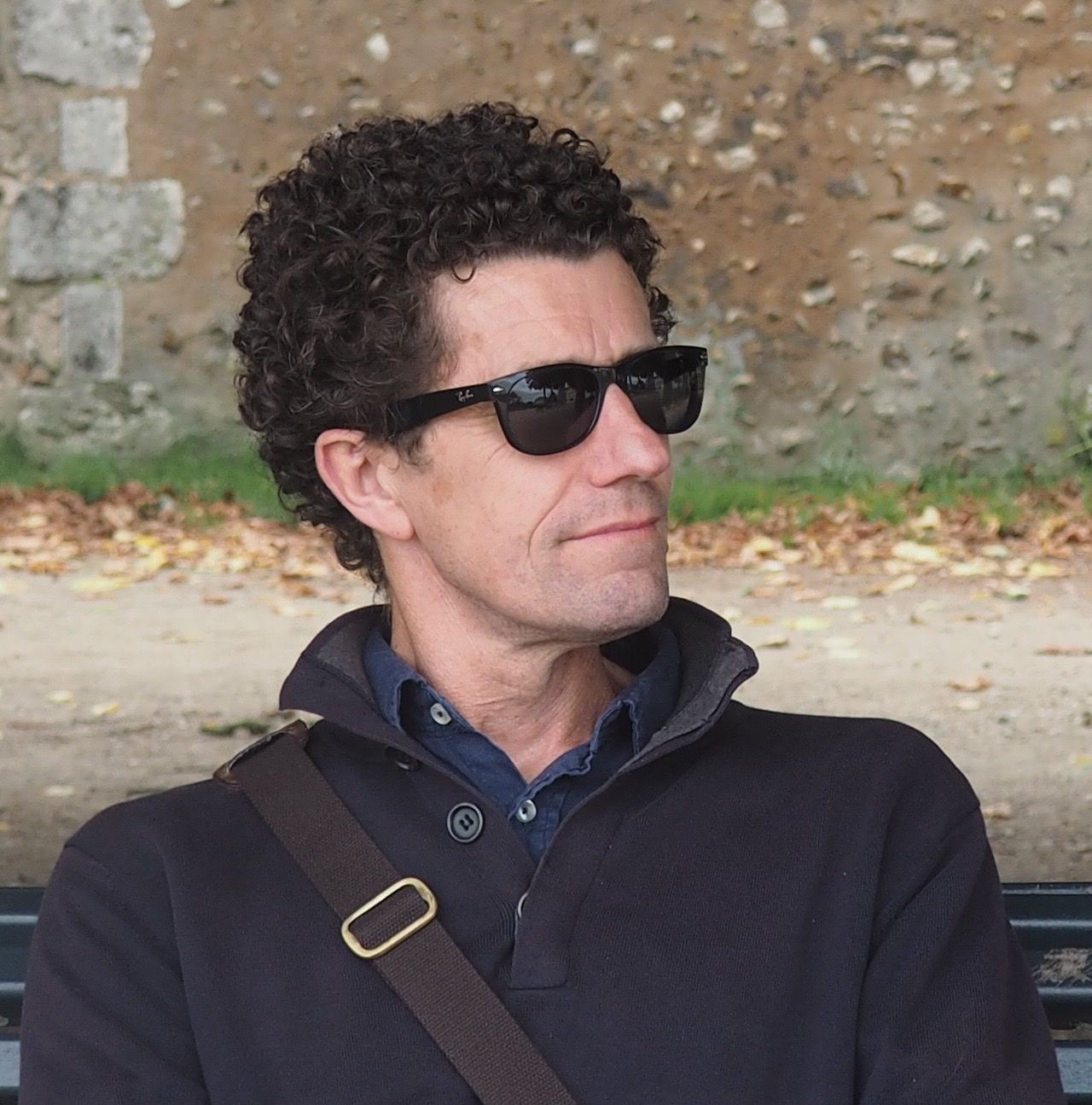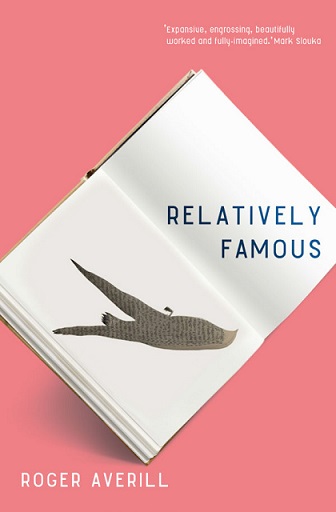
Writers Victoria intern Ellen O’Brien talks to Roger Averill about his new novel ‘Relatively Famous’.
Your latest novel, ‘Relatively Famous’, follows Michael Madigan, the son of a brilliant Australian writer, after the publication of his father’s biography. Michael is forced to confront the intricacies of growing up in the shadow of a father whose artistic achievements were admirable, but his personality less so. It explores the different ways that we tell stories about ourselves and those around us. It also examines the way that we are influenced by the stories that others tell about us. What inspired you to explore these themes?
The issue of artists behaving badly and whether or not their talent secures them an ethical free pass has long interested me. My temperamental response is to dismiss all appeals for ethical special pleading. Yet if Keats is right and ‘beauty is truth, truth beauty’, what are we to make of the ugly side of some truth-tellers? What if Mozart were the snivelling juvenile of Milos Forman’s ‘Amadeus’ or J. M. W. Turner the coarse character of Mike Leigh’s ‘Mr. Turner’? And what if the beauty they brought forth into the world were somehow connected to the less admirable aspects of their treatment of those around them? Would we wish them to be better people and lesser artists? One thing’s for sure, if they had been, no one would be making films about them now. Of course, most of us don’t create the kind of beauty that reverberates down through the ages, so we best be humble about our claims for ethical special treatment. Michael Madigan, though, has lived his life in the shadow of a father who, while neglecting him, has written novels of lasting value. How, then, is he to reconcile his competing impulses to both admire and admonish his father? As with so much in life, the answers are not straight forward, and his attempts to avoid his father’s failings produce problems of their own.
My interest in the different ways we tell stories about ourselves and each other is also long-standing and has a more formal pedigree. Towards the end of last century (I say that to suggest gravitas!), I wrote a PhD thesis about the sociological importance of life writing to our understanding of the intersection between the self and society. The thesis was premised on the belief that our senses of self are largely created by narratives, so that formal life narratives like biographies can be seen as heightened versions of what we constantly do for ourselves and each other. That is, narrate, edit and shape episodes, memories, events and emotions into something like a complex, multi-layered, more or less coherent, always open to revision, story. In ‘Relatively Famous’, Michael’s narrative is a kind of riposte to Sinclair Hughes’s biography of his father. Where ‘Inside the Lion’s Den: The Literary Life of Gilbert Madigan’ conforms to the standard cradle-to-grave linear structure of the genre (an element which is, I think, central to its appeal), Michael’s account of his life is fragmentary, episodic and governed by the contingencies of colliding memories, one thing sparking off another. Early on, I almost spell this out when I have him write: “Remembered time is a shuffled deck. What is lived in sequence, as a line, is recalled as a jumble of colliding instances seemingly absolved from the laws of cause and effect, the everyday physics of existence. Only stories make sense of the mess, tracing or retracing meaning into the curlicues of our lives”.
Given my belief in the importance of narratives to the creation of meaning in our lives, it’s perhaps not surprising that I’ve spent my adult life trying to write stories of one kind or another.
You’ve written across a range of different genres, including biography, travel memoir and fiction. Where do you get your ideas from? How do you know you’re onto something good?
Unlike some writers who seem to be in a race against time to write all the stories their fecund imaginations concoct, my imagination is less productive and has a slower metabolism. The few ideas I do have can ruminate in me for years before finding their form. There has been no design to the way my books have alternated between non-fiction and fiction. Rather, this pattern has arisen in accord with the shape of the stories that have pressed in on me. I like creative non-fiction and fiction equally, partly for their similarities, partly for their differences. Both offer me a creative outlet and the chance to work with language, the only medium I can manipulate with any dexterity. And both help me make sense of myself and aspects of the world, providing me with a vehicle by which to explore thoughts, experiences and emotions. The notable thing with a book like ‘Exile: The Lives and Hopes of Werner Pelz’ was that I only had to research and write the story; its power and poignancy was pre-packaged, provided by my friend Werner, who actually lived through the trauma and triumphs it depicts. Then again, there is something exhilarating about being free of the strictures of the verifiable, to start the writing day knowing you can write about anything, and that whatever you produce will have been mined and smelted from your own imagination.
‘Relatively Famous’ integrates narration by Michael Madigan with sections of his father’s biography. You’ve already had some experience writing biography, having written a memoir about your mentor Werner Pelz. Do you think your experience writing that biography informed the way you wrote this novel?
There’s no doubt that the experience of writing ‘Exile’ influenced my decision to create a fictional biography as part of ‘Relatively Famous’. I enjoy the biographical form and I loved playing with its conventions, setting them off to rub up against Michael’s more haphazard and free-flowing approach to recounting experience. Although I’ve only become conscious of it recently, it seems I’m drawn to writing bi-vocal, or at least bi-focal, texts. My first novel, ‘Keeping Faith’, has two narrative voices, and ‘Exile’ has the personal, memoir thread interwoven with the dominant, more conventional biographical one. It’s not a principled position, though I’m sure I could dress it up as such if needs be, but its definitely a pattern that ‘Relatively Famous’ continues.
One of your characters pessimistically likens the Australian literary scene to “the domed ceiling of the old planetarium, mimicking the vaster skies above.” Do you think this literary cultural cringe still persists, or do you think it has started to change? Where do you think Australian literature is heading?
Michael is referring to the literary scene in 1950s Australia when he draws that analogy. The Australian literary scene has certainly changed enormously since then. Apart from anything else, it has grown to become largely self-sustaining (that is, as long as we don’t expect the majority of our writers to live off their writing!), and has embraced a diversity of voices and perspectives, and is so much the richer for it. And, of course, in recent years there’s been a flourishing of independent publishers, none more important than the remarkable Transit Lounge.* Does the cultural cringe still exist? Well, I suspect most Australian authors are appreciative of any measure of overseas success that comes their way, seeing it as further confirmation of the merits of their work. More a nod, perhaps, than a cringe. (*In the spirit of transparency and full disclosure, I should confess that Transit Lounge is my publisher. Aside from that blemish, it does have an incredibly impressive publishing track record for a small press.)
In your novel, Michael Madigan describes his “desperate search for a creative outlet independent of [his] father’s distinguished career as a novelist”. Did you ever experience such a crisis of meaning, or do you think that writing has always been your calling?
Michael Madigan and I might share a few opinions, and we definitely hang out in the same locations, but what we don’t share are experiences. Unlike him, I haven’t had a father who is either famous or neglectful. In fact, to the degree that I have lived in my father’s shadow, it’s been in my failed attempts to live up to his example of decency. As for the crisis of calling, I don’t share that with Michael either. If, however, I’d displayed even the slightest glint of musical talent I would certainly have joined the never-ending queue of would-be Bob Dylan’s, for he was the Nobel laureate who first turned me on to language. Fortunately, a total absence of ability in that area and most others focused my attention on writing from an early age. Although I had to wait twenty years to be published (despite having written a publishable novel by the time I was 30), I have never regretted being a writer. In the age of neo-liberalism and rational choice theory, the thing that has given my life direction has been the strange medieval sense of having a vocation, of feeling compelled to do something rather than being free to choose it. The best aspect of this is having a craft, something that is both apart of me and yet somehow a part from me. It’s almost like a friend. A demanding, loyal friend, one that frustrates me, but that I never tire of trying to improve.
‘Relatively Famous’ presents a character whose success as a novelist came at the expense of his family’s ambitions and psychological wellbeing. Do you think this is still an issue in modern times? Do you have any advice for people who are trying to become writers and juggle family life, as well?
I’m not sure I qualify as a responsible dispenser of sage advice, but I’ll give it a go. It sounds pretentious to talk of making sacrifices for our art, so let’s instead speak of realising we can’t have everything in life. By most measures, Gilbert Madigan has had it all: talent, acclaim, reasonable wealth, innumerable lovers, loyal friends, and a loving, intelligent late-in-life wife happy to care for him in his dotage. And yet, of course, his commitment to his art (or was it his ambition for it?) resulted in him abandoning Michael. This meant there was at least one thing he could never have – the father/son relationship for which he came to yearn.
Perhaps nowadays we take our parenting responsibilities more seriously. Perhaps we take them too seriously, almost professionally, turning our roles as mothers and fathers into bizarre sub-careers measured by a new set of KPIs (Kid Performance Indicators). Hopefully, though, those of us cursed/blessed with the writing vocation (especially those of us of the male variety), are less inclined to ignore our children’s needs than were our forebears, and that can only be a good thing. Still and all, we can’t do and have everything; something’s got to give. You can’t spend as much time as it takes to learn and practice the craft of writing without sacrificing something: wages, careers, other, easier pleasures – travel, sport, hobbies. Which means that if I were to give advice about the writing/work/family juggle, it would, ironically, be to say not to worry about the writing, because, if you’re compelled to do it, that ball will keep itself in the air. The main thing – the thing Gilbert Madigan didn’t manage – is to not drop the kids!
|
Roger Averill is the author of ‘Exile: the lives and hopes of Werner Pelz’, the novel ‘Keeping Faith’, and a travel memoir ‘Boy He Cry: an island odyssey’. ‘Exile’ won the Western Australian Premier’s Prize for Non-fiction in 2012 and was shortlisted for the New South Wales Premier’s Literary Awards. He lives in Melbourne, Australia.
‘Relatively Famous’ is published by Transit Lounge |
 |
To coincide with this Q&A with Roger Averill, we have a copy of ‘Relatively Famous’ to give away. For your chance to win, email [email protected] with ‘Relatively Famous’ in the subject line.
